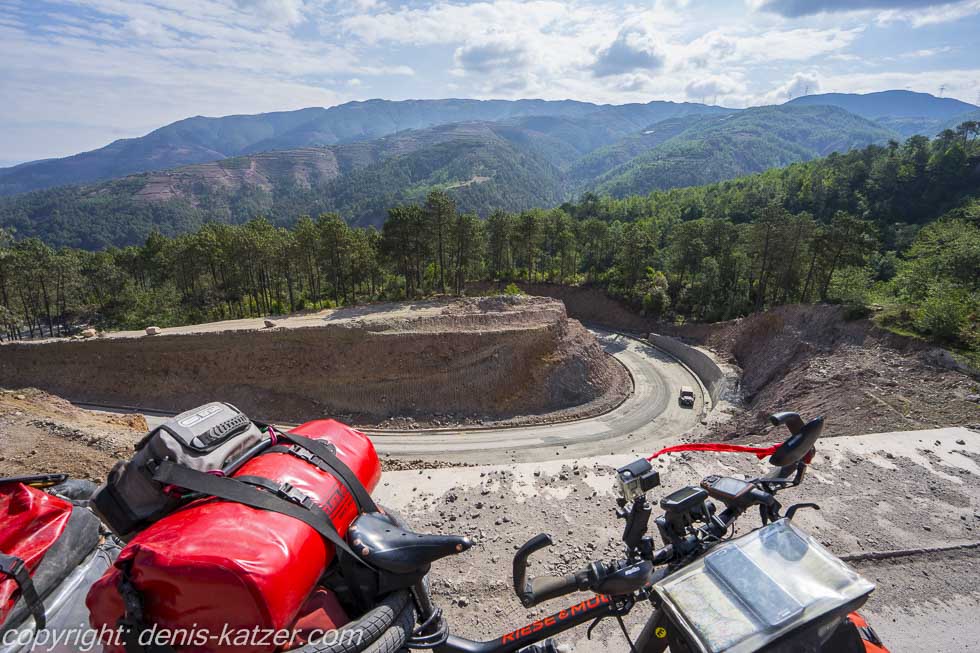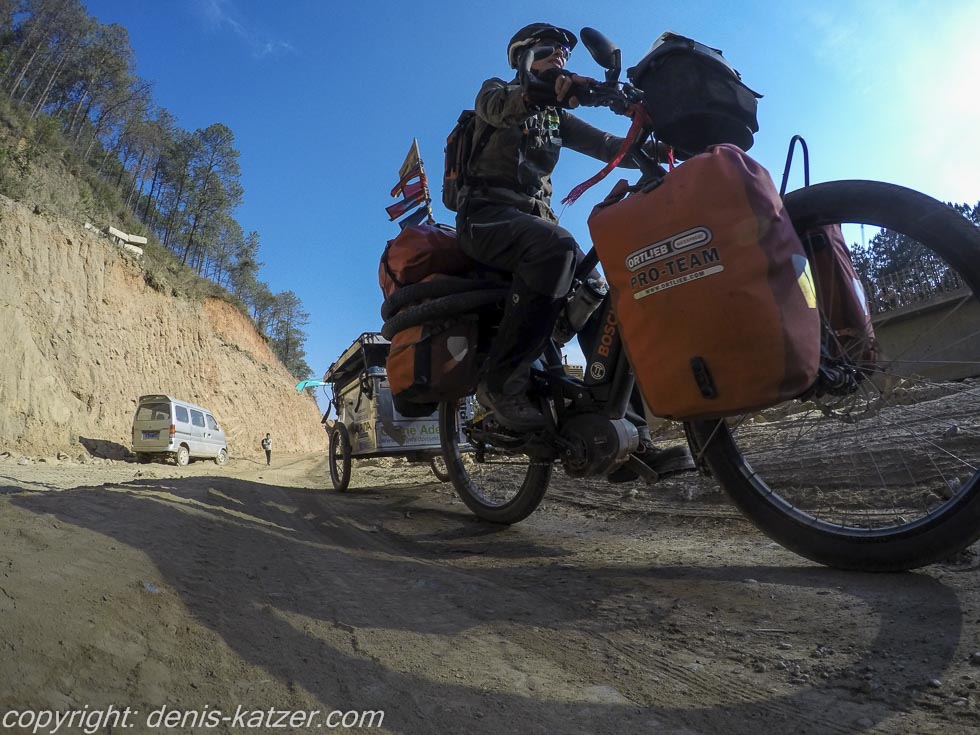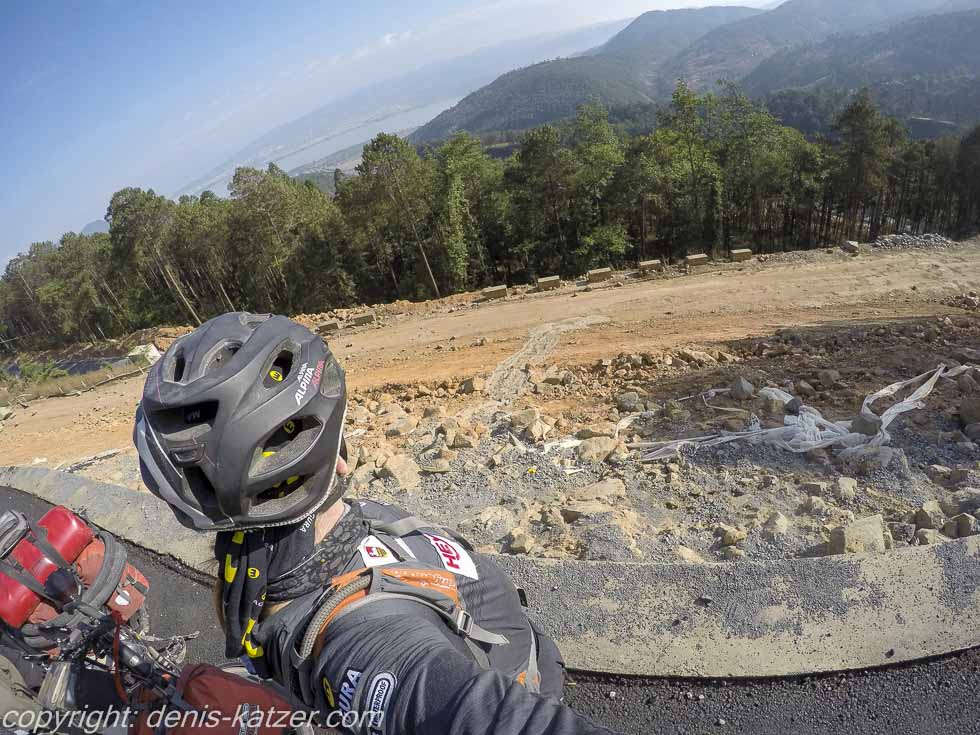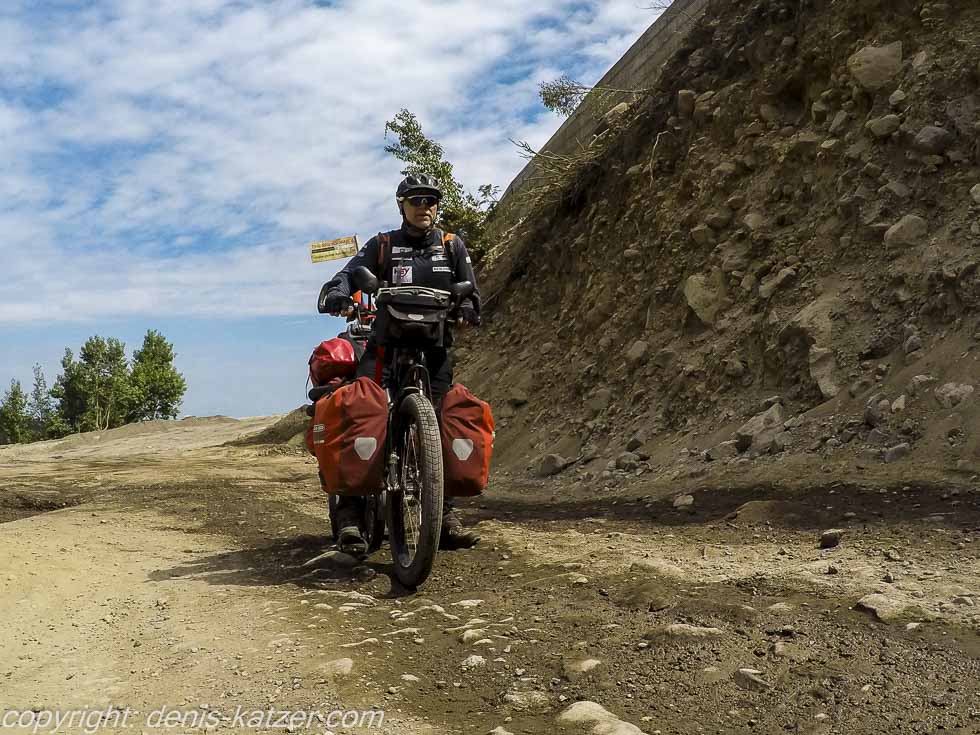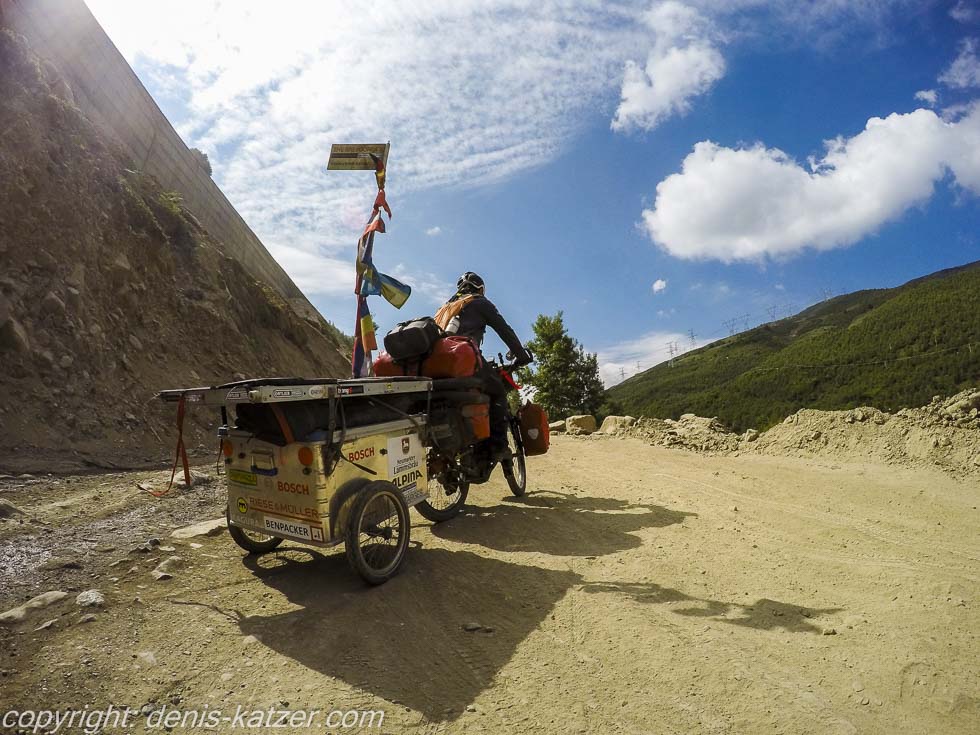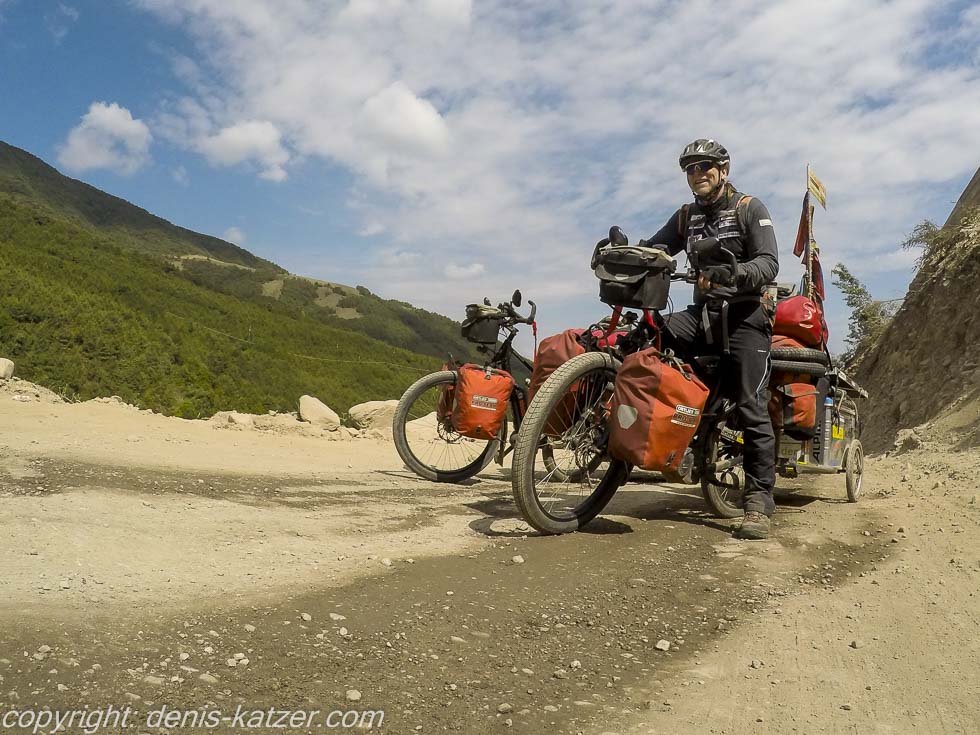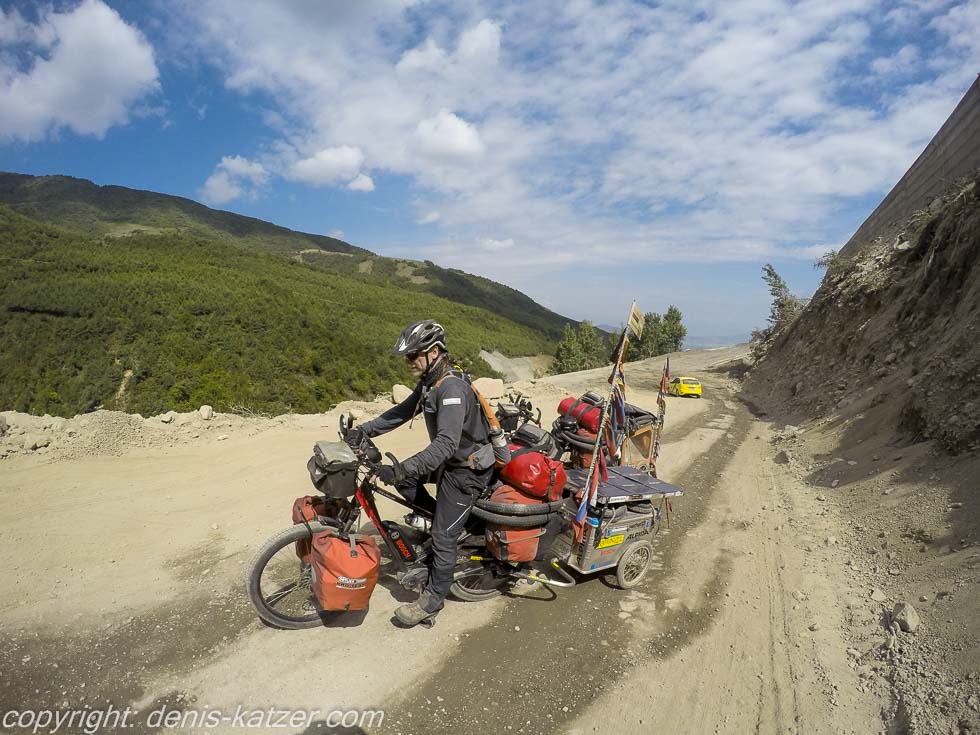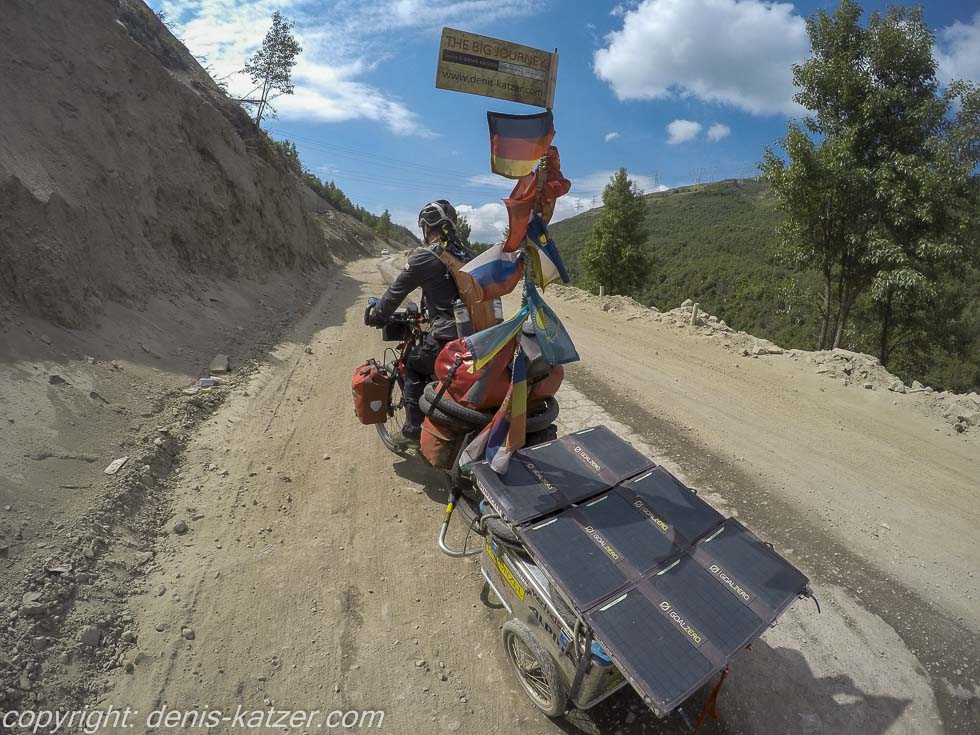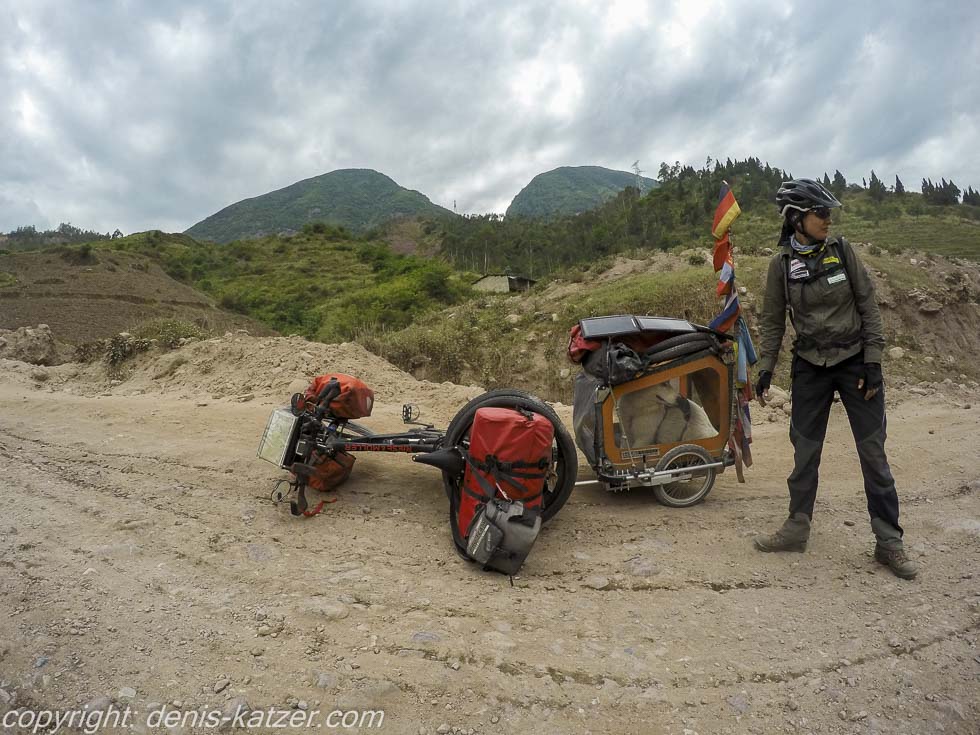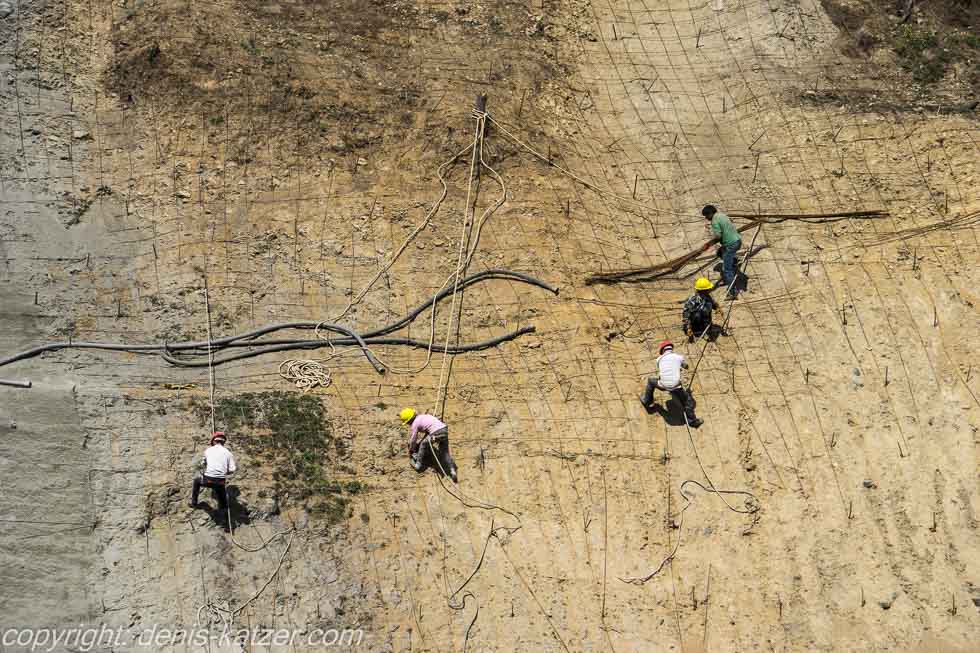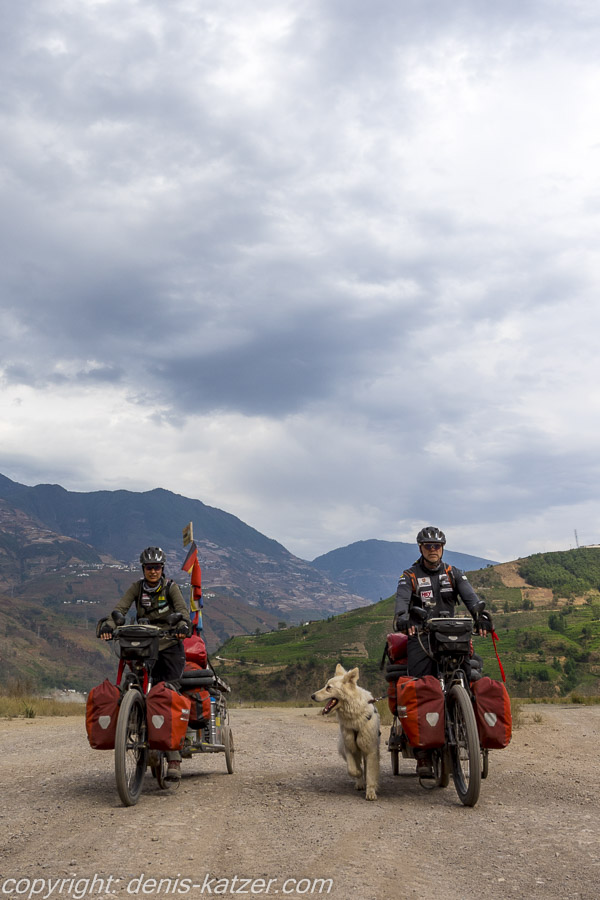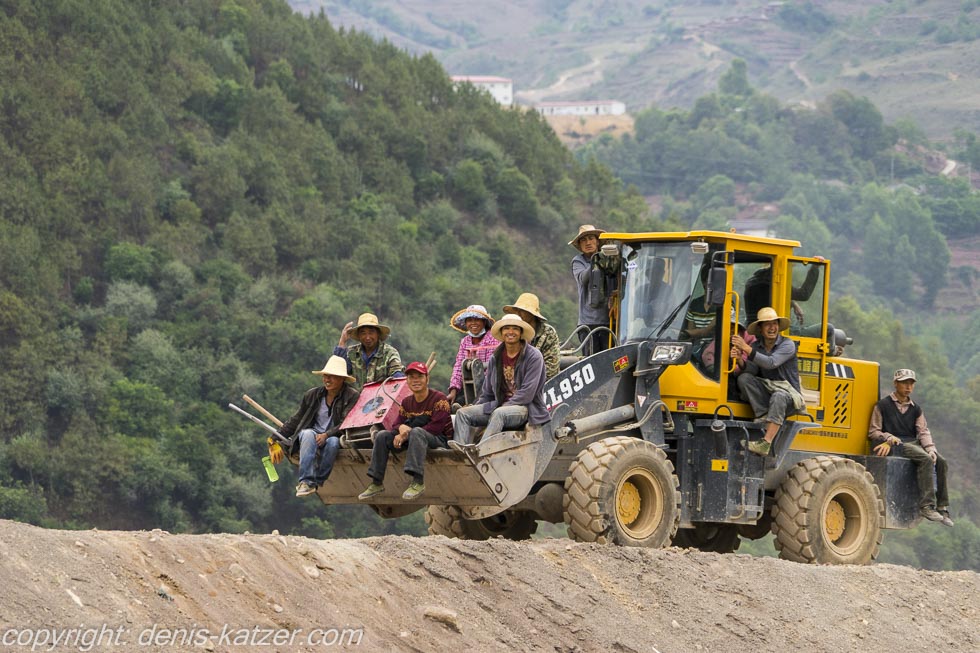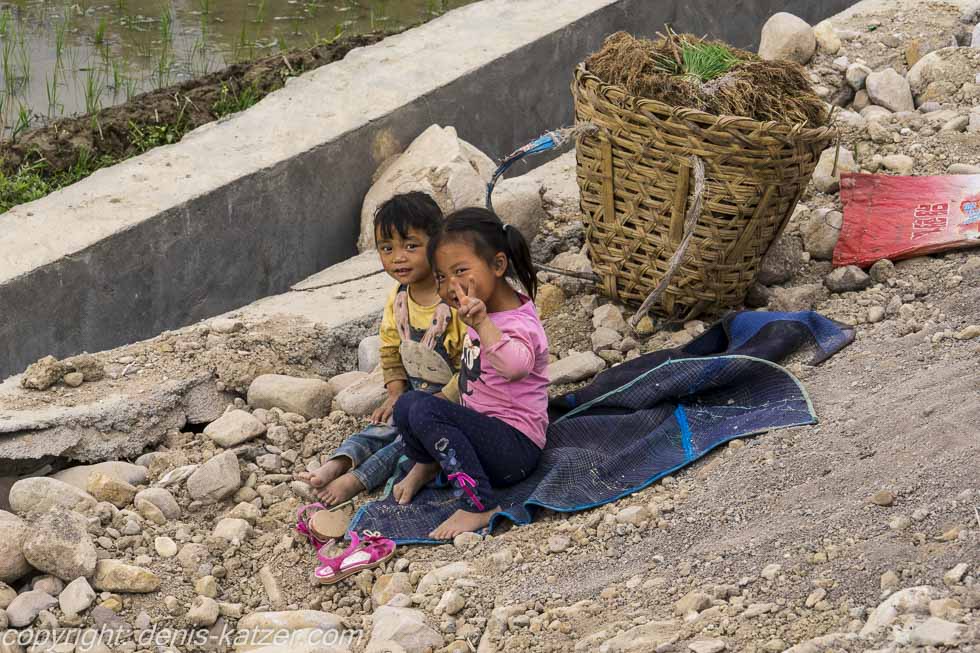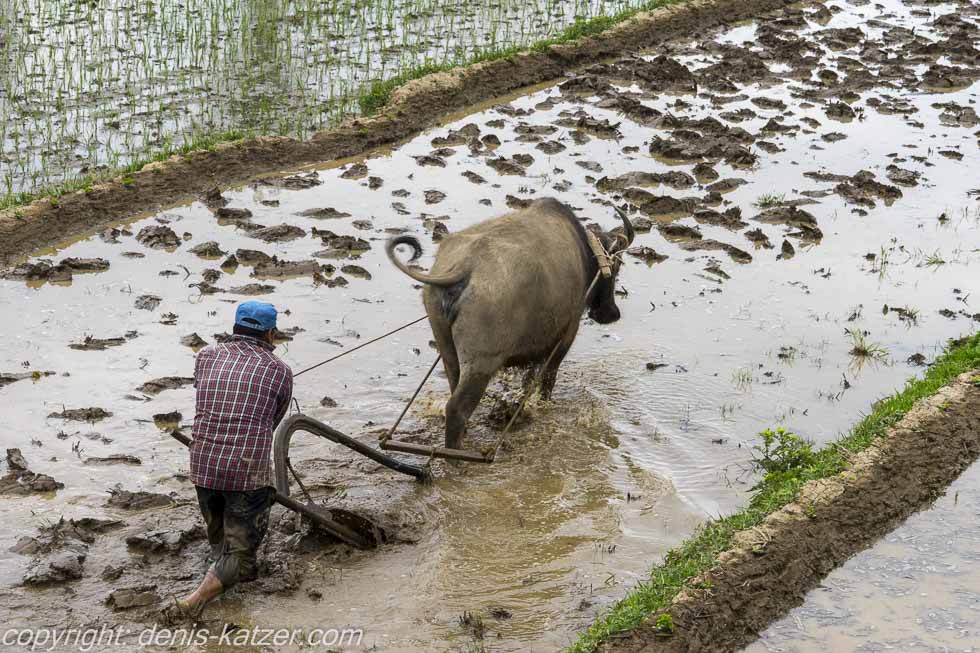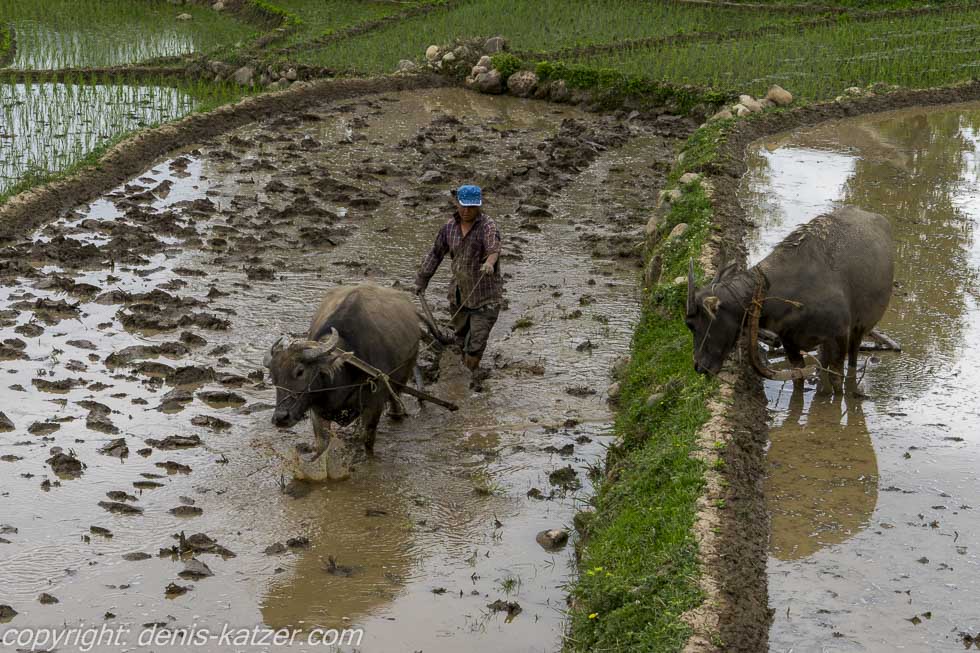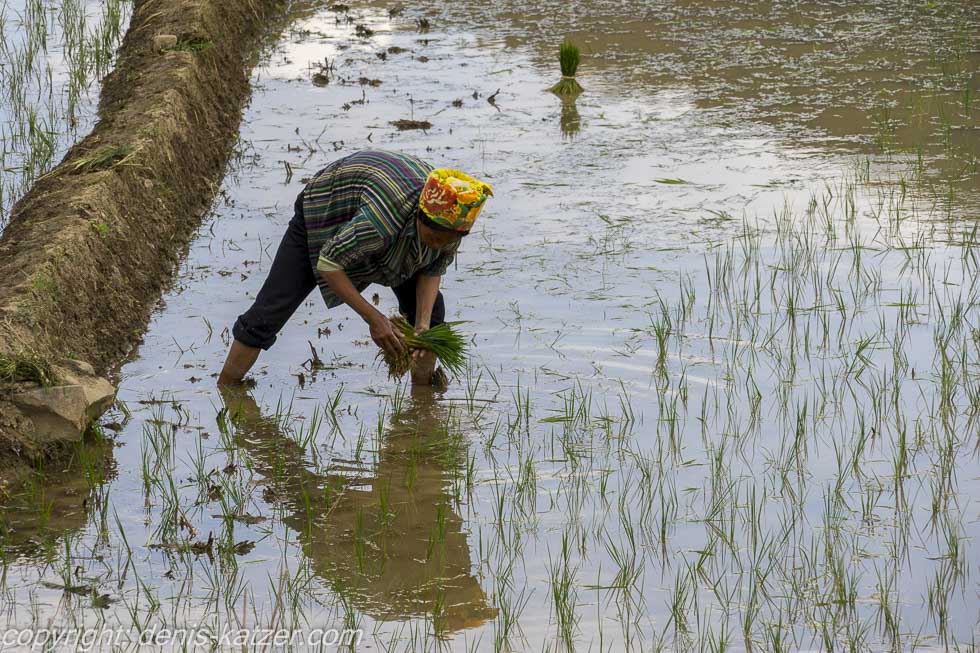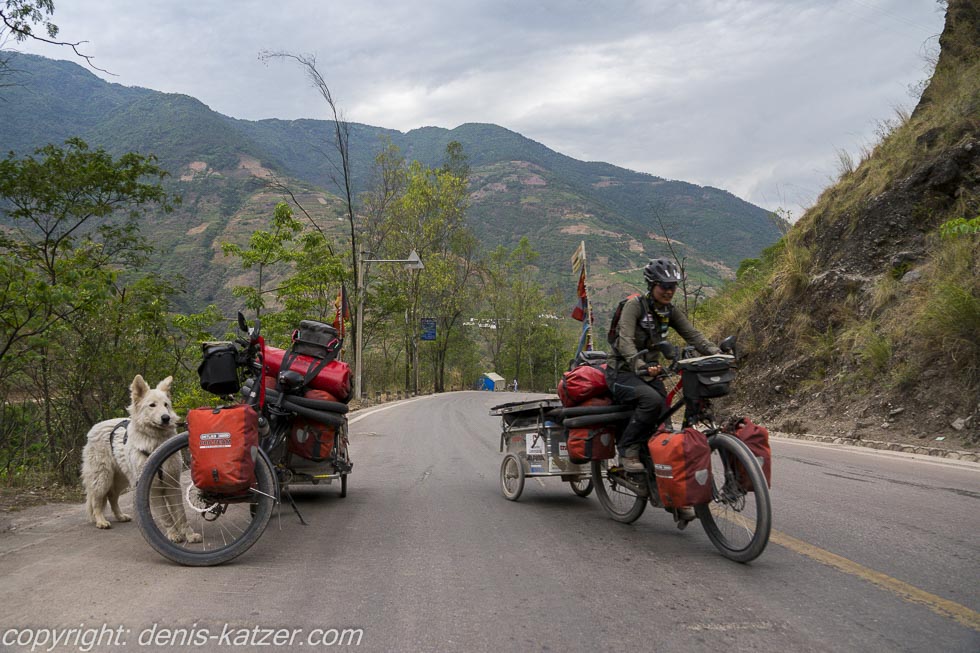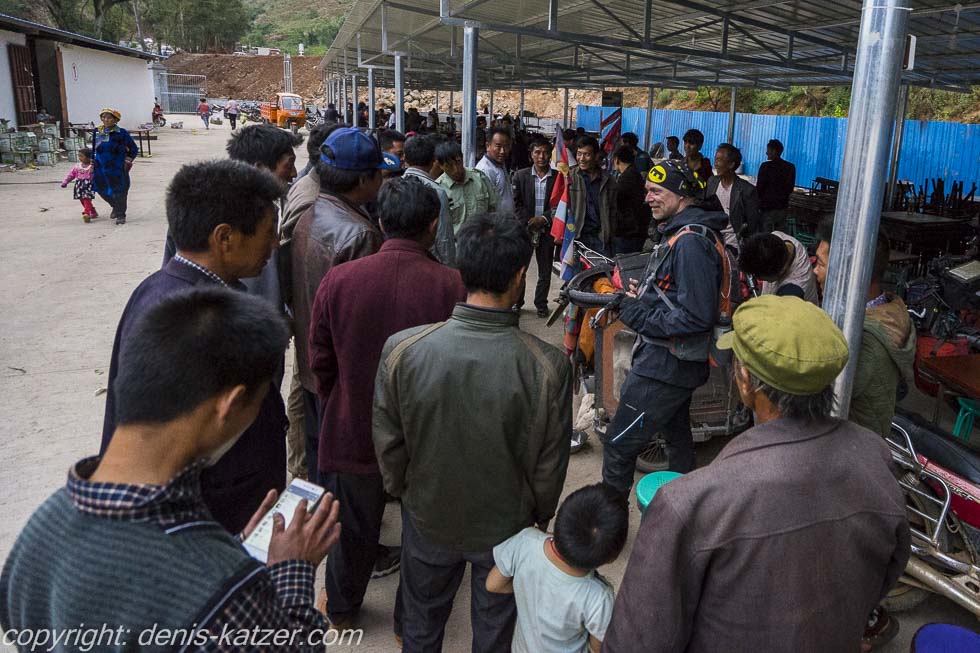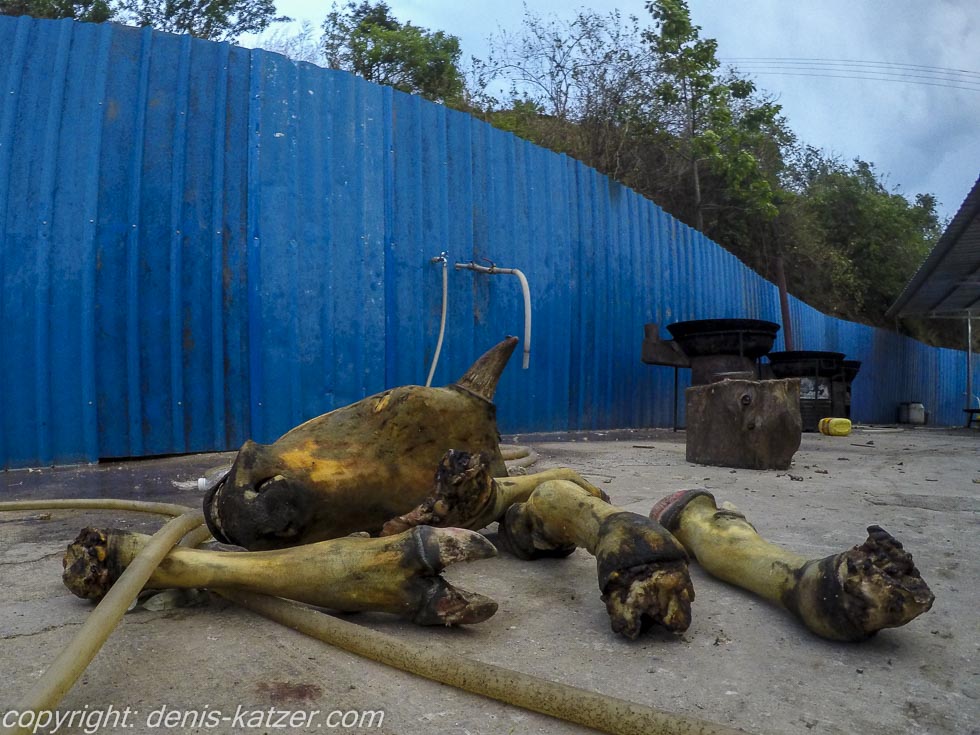
David and Goliath and storm
N 27°04'05.3'' E 102°45'02.3''
Date:
09.05.2016 until 10.05.2016
Day: 317 – 318
Country:
China
Province:
Sichuan
Location:
Ningnan
Latitude N:
27°04’05.3”
Longitude E:
102°45’02.3”
Daily kilometers:
125 km
Total kilometers:
16,649 km
As the crow flies:
104 km
Average speed:
15.9 km/h
Maximum speed:
52.7 km/h
Travel time:
07:32 hrs.
Soil condition:
Gravel track
Maximum height:
2.600
Total altitude meters:
34.245 m
Altitude meters for the day:
1.957
Sunrise:
06:24 a.m. – 06:24 a.m.
Sunset:
7:45 pm – 7:46 pm
Temperature day max:
34°C
Temperature day min:
20°C
Departure:
7:00 a.m.
Arrival time:
20:20
(Photos of the diary entry can be found at the end of the text).
Because today is another long day with over 125 km ahead of us, we get up at 5:00 am and are already on our bikes at 7:00 am. We are in good spirits, although we are still suffering from this stubborn Chinese cold. The sun warms the early morning and an almost cloudless blue sky puts us in a good mood. We cycle along the shore of Qionghai Lake. Its promising blue water beckons after a relaxing day of recreation. But unfortunately we don’t have time for that. “Will we have to cross such a high pass today as we did on the way here?” asks Tanja. “I don’t think so. According to the map, we should come across the Heshui River and from what I could make out, we have to follow the course of the river. That’s why we’re definitely not going back into the mountains,” I assume. As soon as the sentences have flowed out of my mouth, the road leads uphill. The lake slowly recedes although we can still see it lying in the valley for some time from above. “I’m sure the road just winds around the mountain up ahead and then leads back down again,” I say to calm Tanja down a little. But this time, too, I am wrong. As soon as we have pedaled around the long bend, the road winds its way upwards in serpentines. In addition, clouds of dust herald the end of the beautiful asphalt. Just a few hundred meters further on, our tires work their way over a gravel and clay track that is riddled with countless holes and deep hollows like a Swiss cheese. At 8:00 a.m. it is already very warm. Again and again we are forced to take a breather. Tanja suffers from circulatory problems due to the sudden onset of heat. We have to stop again and again until her dizziness has subsided. “Do we have anything for unstable circulation in our first-aid kit?” I ask anxiously. “Don’t think so,” I hear. “Just stop in time. I don’t want to have to scrape you off the road,” I admonish her and wonder how we are supposed to manage 125 kilometers of gravel roads over the Daliang Mountains under these circumstances.
At 9:00 a.m. it is hot with 34 degrees in the shade. Dust has eaten into our clothes and it looks like we are once again victims of a pass road under construction. “How are you?” I ask Tanja, who pulls up next to me with a bright red head. “I’m fine,” she snorts. “You should eat a banana. Maybe the fructose will help a little,” I think, which is why we stop to recover again. After 10 minutes we pedal on towards the sky. To our left and right, construction workers hang from ropes on the steep mountain flanks. With great effort and at the risk of their lives, they cover the scree and rock faces with a mesh of steel in order to later spray liquid concrete onto them. In this way, drivers will be protected from falling rocks and stones in the future.
Suddenly the slope becomes so steep that it can only be mastered in first gear. I kick my horse to a place where I can put it on the stand and hurry back to the hairpin bend to shout instructions to Tanja. I’m just in time. “Take a wide arc and shift into third and then straight into first gear!” I shout at her. Tanja takes the bend as instructed, shifts into third and then immediately into first to take the climb. However, her strength is not enough and her heavy bike comes to a halt at the critical, steepest point. She has the presence of mind to apply both brakes, but the bike starts to slide backwards. I am immediately on hand to help her hold the bike. “Please get off. I’ll try to drive up for you,” I say. “You’ll never make it,” says Tanja. “Yes, you just have to push hard,” I reply. Now that I’m on the handlebars and Tanja has positioned herself behind the trailer, I take a few deep breaths. “I’ll give the command,” I say. “Okay.” “Now!” I shout, shift the reliable Rohloff into first gear and pedal hard. The front wheel rises up as if I had put spurs to a horse. My left knee hits the center bar. The pain shoots through my brain, but I keep pedaling like a madman while Tanja pushes with all her strength. Then we managed to overcome the critical point together. As if my lungs were collapsing, I gasp to recover from the exertion. Tanja leans on the trailer with both hands and is also panting like a steam engine. As the rest of the climb remains steep, I now take it in turns to ride one bike after the other uphill. An expensive four-wheel drive vehicle honks its horn. Without the slightest consideration, he shoots just past me. I just stumbled. The front tire rolls slowly over a fist-sized boulder. Too slow. The wheel tilts. I jump out of the saddle to avoid hitting the side and land with both feet next to my Riese and Müller lying in the dirt. Tanja comes running. “Has something happened to you?” “No, everything’s okay. I hope the bike is undamaged,” I reply. Together we lift it upright again. After the first inspection, only the bracket for the on-board computer is bent. I straighten them out again, get on and continue pedaling upwards.
It’s only 50 meters to the apex when I notice in the corner of my eye how a bus is about to roll down the potholed slope. If the driver had only waited two minutes up there, I would have passed him. But he doesn’t seem to care if he crushes me in a few moments. Primal forces explode inside me. I steer my vehicle into the middle of the slope and head towards the bus. The only tactic to prevent him from grinding me against the scree wall to my left or sending me plummeting into the hundred-meter-deep gorge to my right. I continue stoically and stay on the front course. There is no room for evasion here. “What was that idiot thinking?” I think to myself. Tanja screams behind me. She is standing by the other wheel. When our dissimilar vehicles are only three meters apart, the bus brakes. Good so far. At least he didn’t kill me. As I can’t go any further, I also stop and shout at the bus driver. He laughs. His co-driver laughs too. The driver signals. “Move aside!” he shouts, waving his hand in the direction of the abyss. “But there’s no room.” I shake my head. Tell him to maneuver back the twenty meters. He says no. It is also impossible to let the bike with the trailer roll down the hill backwards. David and Goliath are now facing each other. I realize that as soon as I give in, I’m doomed. The bus would squeeze past me and push me into the abyss. In China, this would settle the question of guilt, because from what I’ve heard, it’s always the fault of the person in the back. If a cyclist lies dead in the abyss, it certainly wasn’t the bus driver. What’s more, you wouldn’t even be able to detect a scratch on the pile of rusted sheet metal. Apart from that, I don’t care about the question of guilt in this case either way. The main thing is to get out of here unscathed. The passenger gets out of the metal box, still laughing, and wants to order me to the side of the abyss. “Meo”, I remain firm, because my bike could just about fit past there, but never the trailer. Finally, the driver engages reverse gear and drives back a few meters. He pushes his fully occupied passenger bus close to the scree wall. This frees up a narrow passage on the side of the abyss. I shake my head again. “Too narrow!” I shout. “Meiwentí” (no problem) says the passenger. I take another look and come to the conclusion that it could work. The passenger now pushes the trailer while I try to keep the front wheel on the track. It bumps over packed earth crumbs, lumps of stone and through holes. I struggle to stop the tire from drifting too far to the right. To where the depths beckon me. Beads of sweat roll down my forehead and sting my eyes. Two minutes later, I’m standing safely behind the coach with slightly wobbly knees. I quickly put my Roadtrain on the stand and hurry down the hill to get Tanja’s bike. However, she and her passenger pushed it to the critical area in front of the bus. As soon as our e-bikes have been brought to safety behind the bus, the engine roars to life. A black cloud of diesel coughs towards us from the rust-eaten exhaust until the vehicle disappears downhill. We take a breather and drink a liter of water. Meanwhile, countless cars and trucks rumble up the slope. A road worker, whom we apparently didn’t notice during the ascent, must have cleared the single-lane road below us for uphill traffic. The cloud of dust and dirt from the vehicles thundering past obscures our view. We put on our masks and continue until we reach the highest point of the pass at 2,600 meters.
From now on, the route leads through a beautiful high valley. Rice terraces line the mountain flanks. Farmers plow through their rice fields with water buffaloes. Women stand barefoot in the water and plant virgin rice plants. Because the road is still single-lane and is only open for one direction of travel at regular intervals, we sometimes find ourselves in the fantastic situation of being alone on the road. I change the worn brake pads on Tanja’s bike. After 250 km of gravel road and 3,500 meters of altitude, they are through. We push our bikes on particularly bad sections of slope. Although this is time-consuming, it is easy on the material and may protect us from a fall. The sun is now swallowed up by heavy storm clouds. We breathe a sigh of relief because the temperature has become bearable.
It is already 17:00. We have been following the Heshui River for hours. Since the long descent this morning, we have been moving at an altitude of 900 to 1,100 meters. We drive in the last battery as we leave the Heshui and the road winds upwards again. The thunderstorm that has been following us for half the day seems to be catching up with us. Strong gusts of wind blow across the road. Lightning flashes through the approaching dark clouds. Although I’m completely exhausted from today’s exertion, I ride in Eco and Tour mode. The only way to save a lot of energy. The storm catches up with us during the ascent. The rustling in the trees sounds as if a hissing dragon is following us. We stop to put on our rain gear and attach the blinkies to the trailers. This way, approaching cars can see us in good time. “Let’s get out of here!” I shout as the first branches crash from the trees onto the road. It’s still eight kilometers to Ningnan. The increasing storm stirs up dust and fountains of dirt. Grains of sand find their way into your eyes despite your glasses. I stop briefly to get them out again. Then I cycle after Tanja. I look up nervously. The trees move as if they are about to break. Leaves, garbage and small sticks swirl around. Sometimes a gust of wind pushes us to one side. The scenario gets scarier by the minute. Oh what a day. The road suddenly rises steeply in front of us. “We’ll never get up there on our battery charge!” exclaims Tanja. A walled courtyard appears on our right. Through the open gate I recognize some people who seem to be celebrating inside – “Let’s seek shelter there!” I shout to Tanja. The moment we steer our bikes through the gate, a huge fountain of dirt whirls after us. We are protected inside for the time being. People look at us in amazement as we roll past them. We park our bikes under a corrugated iron roof. Since I assume I’m in some kind of street restaurant, I order a beer. “There’s no beer,” I understand, even though every one of the perhaps hundred people present has one on the table. It is not long before we find out that we have landed at a private Yi party. We are immediately bought a beer. One of the men tugs on my sleeve and keeps bringing his hand to his mouth. “Would you like something to eat?” he asks. Not to be rude, I follow him. The head of a buffalo lies on the concrete floor. His fur is torched with fire. His dead eyes seem to look at me reproachfully. At least that’s how it seems to me. A man rushes over, grabs the large nose with his fingers and lifts the heavy buffalo head. Blood drips from his neck as the man carries him away. My patron walks with me to huge pots and bowls. At least one meter in diameter. He lifts one of the equally huge lids. My eyes fall on coarse pieces of meat and fat. Offal also rolls around in the pot. With his bare hands, the man takes out some of the pieces and places them in a used porcelain bowl. When he looks at me, he must recognize my reluctance, pours the contents of the bowl back into the giant pot, takes the porcelain and washes it in a basin of cloudy water. Then he runs his hand through the wet bowl to dry it a little, reaches back into the giant pot and fills it generously with the cooked pieces of meat from the ox. It takes a while to make him realize that he is a vegetarian. Even if that’s not entirely true, as I still eat some meat on the odd rare occasion. My patron looks at me incomprehensibly. “How can you turn down a feast like this?” he seems to ask. “Beer is absolutely enough for me,” I reply with a laugh. When I get back to Tanja, I tell her about my experience. We discuss the next steps. In the meantime, part of society has gathered around us. They pester us with questions, many of which we don’t understand. After a hard day, involuntary communication is exhausting. We try to smile, explain where we come from and where we are going. My gaze falls on a socket on a wall. I unpack our four-pin plug, get our four chargers and four empty batteries to place everything on a small bench by the wall and plug it in. “Load up!” I shout to Tanja, who is surrounded by people. As soon as I rejoin her, a mighty squall blows into the courtyard. There is a brief flash, then the power goes out. “Are the batteries still charging?” asks Tanja anxiously. “No, everything is dead. No more power,” I reply and because 20 minutes later there’s still no movement, I put everything back in the trailer. “And what do we do now?” asks Tanja. “It’s only 8 km to the city and this isn’t the first time we’ve reached the limit of the battery capacity on this trip. I’m driving in ecomode. That saves a lot of energy. We’ll make it with that,” I say. “In ecomode? I’ll never get up that steep hill.” “You ride normally in sport or turbo mode. We still have some energy left in my 500 watt battery. That’ll get us to the city,” I reassure her. Although the storm continues to rage, we leave the safety of the walls and the party. Without much effort, we tackle the climb that seemed insurmountable just an hour ago.
By now it is pitch dark. Branches are lying on the road. The first lights of Ningnan shimmer through the trees bending violently in the storm. We quickly find the small, simple hotel. We are allowed to put our bikes behind the sofa in the tiny reception room. As soon as we are in our room, the storm unleashes its full force. “I’ll go up to the roof and have a look from above,” I say to Tanja. “Make sure nothing flies at your head,” she warns. I’m walking down a corridor past the rooms when the power goes out in the city too. The wind howls through the house at a frightening volume. Windows break, glass splinters. I find my way to the roof. The electricity is back and illuminates the spectacle. The people in the streets act as if the strong wind is none of their business. Cabs stand below a large mast that bends precariously and could break at any moment. I wonder why cab drivers don’t recognize this danger. Suddenly, signs fall over, pieces of sheet metal whirl through a road, a tree snaps, posters are torn to shreds and the traffic jams. Blue light flashes from house wall to house wall. A siren can be heard. Although the gusts are borderline, there are still mopeds on the roads. Fascinated by the spectacle, I try to capture it on film. Suddenly, one of the gusts of wind hits the roof. Litter, bowls and laundry swirl around. As if Tanja had suspected it, the bowl hits me on the head. Fortunately, it’s made of plastic. I take cover behind a stone wall. “I’ve seen enough for today,” I think to myself and climb back down the steps. The power fails again, so I have to feel my way through the corridor. It would have been unthinkable if we had had to spend the evening in a tent. China is undoubtedly a country of superlatives. But maybe it’s just that you have to get to the right place at the right time? But how do you want to control something like this? Anyway, at this moment we’ve been lucky and are sitting behind walls. As I step into the room, the wind bangs against the window. I draw the curtains. Just in case one of the panes breaks and we don’t get hit by the shards. Because the mattresses in simple hotels are often as hard as boards, I blow up my sleeping mat, lie down on it exhausted and think about today’s 125 kilometers, 2,000 meters of altitude, construction sites, gravel, clay and potholed roads, the crazy bus and reckless jeep drivers. It’s only natural that the question of the meaning of such an adventure should be running through my mind. But luckily not every day is so hard. On the other hand, in this way we experience a life that forces us into the moment. On such days, no thought has the slightest chance of escaping into the inessential, the inane, the profane. Many people are downright tormented by their wandering minds. Many people look for problems where there are none, miss out on their lives through routine and daily routines and then ask themselves, when they are old, where has life gone? No doubt at the end of my life my mind will have great difficulty asking me such questions. There is no doubt that I know where and how I have spent my life. I know that my life is full of countless adventures, experiences and adventures. This unusual, exciting day will also be part of it and I don’t want to miss a moment of it…
If you would like to find out more about our adventures, you can find our books under this link.
The live coverage is supported by the companies Gesat GmbH: www.gesat.com and roda computer GmbH http://roda-computer.com/ The satellite telephone Explorer 300 from Gesat and the rugged notebook Pegasus RP9 from Roda are the pillars of the transmission.
